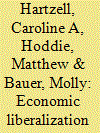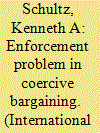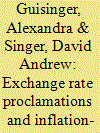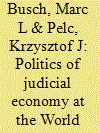|
|
|
Sort Order |
|
|
|
Items / Page
|
|
|
|
|
|
|
| Srl | Item |
| 1 |
ID:
095023


|
|
|
|
|
| Publication |
2010.
|
| Summary/Abstract |
The creation of an International Criminal Court (ICC) to prosecute war crimes poses a real puzzle. Why was it created, and more importantly, why do states agree to join this institution? The ICC represents a serious intrusion into a traditional arena of state sovereignty: the right to administer justice to one's one nationals. Yet more than one hundred states have joined. Social scientists are hardly of one mind about this institution, arguing that it is (alternately) dangerous or irrelevant to achieving its main purposes: justice, peace, and stability. By contrast, we theorize that the ICC is a mechanism to assist states in self-binding, and draw on credible commitments theory to understand who commits to the ICC, and the early consequences of such commitments. This approach explains a counterintuitive finding: the states that are both the least and the most vulnerable to the possibility of an ICC case affecting their citizens have committed most readily to the ICC, while potentially vulnerable states with credible alternative means to hold leaders accountable do not. Similarly, ratification of the ICC is associated with tentative steps toward violence reduction and peace in those countries precisely least likely to be able to commit credibly to foreswear atrocities. These findings support the potential usefulness of the ICC as a mechanism for some governments to commit to ratchet down violence and get on the road to peaceful negotiations.
|
|
|
|
|
|
|
|
|
|
|
|
|
|
|
|
| 2 |
ID:
095027


|
|
|
|
|
| Publication |
2010.
|
| Summary/Abstract |
Previous studies that have explored the effects of economic liberalization on civil war have employed aggregate measures of openness and have failed to account for potential endogeneity bias. In this research note, we suggest two improvements to the study of the relationship between liberalization and civil war. First, emphasizing that it is processes that systematically create new economic winners and losers rather than particular levels of economic openness that have the potential to generate conflict, we consider the effects of one oft-used means of liberalizing economies: the adoption by countries of International Monetary Fund (IMF) structural adjustment programs. Second, we use a bivariate probit model to address issues of endogeneity bias. Analyzing all data available for the period between 1970 and 1999, we identify an association between the adoption of IMF programs and the onset of civil war. This finding suggests that IMF programs to promote economic openness unintentionally may be creating an environment conducive to domestic conflict.
|
|
|
|
|
|
|
|
|
|
|
|
|
|
|
|
| 3 |
ID:
095022


|
|
|
|
|
| Publication |
2010.
|
| Summary/Abstract |
The results of deliberations in multilateral fora are often considered ineffective. Decision making in the European Union (EU) and in particular its key intergovernmental body, the European Council, poses no exception. Especially in the domain of EU foreign and security affairs, the unanimity requirement governing this institution allegedly allows nationalist governments to torpedo any attempt to build up a credible European defense force and a unified foreign policy stance. In this article, we take issue with the claim that multilateral summits merely result in "hot air" by looking at whether and how decisions made during EU summit meetings affect the European defense industry. We argue that investors react positively to a successful strengthening of Europe's military component-a vital part of the intensified cooperation within the European Security and Defense Policy (ESDP)-since such decisions increase the demand for military products and raise the expected profits in the European defense industry. Our findings lend empirical support to the view that financial markets indeed evaluate the substance of European Council meetings and react positively to those summit decisions that consolidate EU military capabilities and the ESDP. Each of the substantial council decisions studied increased the value of the European defense sector by about 4 billion euros on average. This shows that multilateral decisions can have considerable economic and financial repercussions.
|
|
|
|
|
|
|
|
|
|
|
|
|
|
|
|
| 4 |
ID:
095025


|
|
|
|
|
| Publication |
2010.
|
| Summary/Abstract |
This article explores the strategic problems that arise when a state seeks to use military force to compel changes in another state's policies. Although the costs associated with military action mean that there generally exist compromises that both sides prefer to conflict, bargaining may fail if such deals are not enforceable in the face of temptations to renege on policy concessions. This study develops a model that shows that inefficient conflict can occur when states bargain over policies that one of them can change unilaterally and covertly. I then show that this theory is useful for understanding a common source of international conflict: conflicts that arise when one state supports rebel groups engaged in a civil war with another state. Episodes of rebel support are associated with a substantial increase in the risk of interstate militarized disputes, the lethality of these disputes, and the likelihood of repeated violence. Agreements to limit rebel support are unlikely to reduce interstate violence unless they are coupled with concessions by the target state and/or monitoring mechanisms, both of which are shown theoretically to mitigate the enforcement problem.
|
|
|
|
|
|
|
|
|
|
|
|
|
|
|
|
| 5 |
ID:
095026


|
|
|
|
|
| Publication |
2010.
|
| Summary/Abstract |
If governments choose economic policies that often run counter to their public commitments, are those commitments meaningless? We argue that government proclamations can be critical in signaling economic policy intentions. We focus on the realm of exchange rate policy, in which countries frequently implement an exchange rate regime that differs from the officially declared regime. We argue that the official exchange rate regime is one of the most important signals of a government's economic policy preferences. When a government makes a de jure public commitment to a fixed exchange rate, it sends a signal to domestic and international markets of its strict monetary-policy priorities. In contrast, a government that proclaims a floating exchange rate signals a desire to retain discretion over monetary policy, even if it has implemented a de facto fixed rate. We use data on 110 developed and developing countries from 1974 to 2004 to test two hypotheses: first, that governments that adopt de facto fixed exchange rates will experience less inflation when they back up their actions with official declarations; and second, that governments that abide by their commitments-as demonstrated by a history of following through on their public declarations of a fixed exchange rate regime-will establish greater inflation-fighting credibility. Within developing countries, democratic institutions enhance this credibility. Results from fixed-effects econometric models provide strong support for our hypotheses.
|
|
|
|
|
|
|
|
|
|
|
|
|
|
|
|
| 6 |
ID:
095024


|
|
|
|
|
| Publication |
2010.
|
| Summary/Abstract |
International institutions often moderate the legal decisions they render. World Trade Organization (WTO) panels do this by exercising judicial economy. This practice, which is evident in 41 percent of all rulings, involves the decision not to rule on some of the litigants' arguments. The constraint is that it can be appealed. We argue that panels exercise judicial economy when the wider membership is ambivalent about the future consequences of a broader ruling. This is proxied by the "mixed" (that is, nonpartisan) third-party submissions, which are informative because they are costly, jeopardizing a more decisive legal victory that would benefit these governments too. We empirically test this hypothesis, and find that mixed third-party submissions increase the odds of judicial economy by upwards of 68 percent. This suggests that panels invoke judicial economy to politically appease the wider WTO membership, and not just to gain the litigants' compliance in the case at hand.
|
|
|
|
|
|
|
|
|
|
|
|
|
|
|
|
|
|
|
|
|